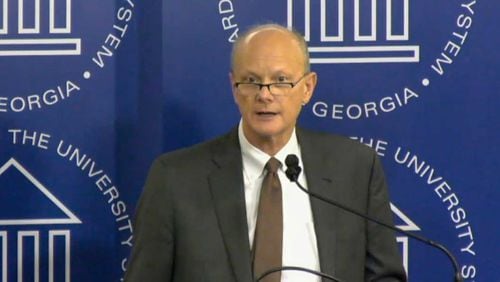The University System of Georgia announced today that Chancellor Steve Wrigley will retire this summer.
Wrigley has led Georgia’s 26 public colleges and universities since 2017. For the last 10 months, he has piloted state campuses through the trials and challenges of COVID-19.
Two of USG’s big decisions during the pandemic-- to maintain letter grades in the spring rather than embrace pass/fail and to reopen campuses in the fall semester -- put Wrigley at odds with many students and faculty.
Wrigley has a 36-year history in public service, serving as USG’s executive vice chancellor of administration and in several key roles at the University of Georgia. Before moving to USG, Wrigley was chief of staff to Gov. Zell Miller.
Here is the official statement from USG:
“It has been a great privilege and honor to serve the citizens of Georgia,” Wrigley said. “During a career in education policy and administration, I have worked with many incredible people and made countless cherished friendships. The mission of the University System of Georgia is essential to our state, the work of its faculty and staff invaluable and the leadership of its presidents and board extraordinary.
“I am grateful to my family and members of the Board of Regents for their support and guidance, and I especially appreciate the support and leadership of Governors Kemp and Deal during my time as Chancellor,” Wrigley added. “Thanks to the vision of Georgia governors and members of the General Assembly over many years, Georgians can be proud of their university system, which is recognized among the best in the nation. As a graduate of this system, it has been a special honor to help students pursue their own dreams.”
“For several decades, Chancellor Wrigley has devoted his career to serving his fellow Georgians,” Georgia Governor Brian Kemp said. “Since assuming his role as Chancellor of the University System of Georgia, he has helped our higher education system achieve new heights.”
During his time as Chancellor, Wrigley focused on three top priorities for USG: make college more affordable, more efficient and ensure more Georgians enter the workforce with a college credential.
Under Dr. Wrigley’s leadership, USG:
- Launched the data-driven “Momentum Year” student success initiative to focus on increasing college completion rates, help more students earn a college degree and close gaps in academic achievement.
- Experienced an almost 10 percentage point increase in four-year graduation rates – a rate that has risen for each of the past six cohorts of entering freshmen.
- Saw among the largest increases in the nation over the last five years for six-year college completion rates, according to the National Student Clearinghouse Research Center.
- Awarded 70,879 degrees this past fiscal year, the most in the system’s 89-year history. Since 2011, the number of USG degrees awarded annually has increased by more than 29%.
- Received the 2019-2020 Exceptional Agency Award by the State Higher Education Executive Officers Association (SHEEO) which recognizes leadership, dedication and innovation in state higher education policy and administration.
- Kept average annual tuition increases over the past five years to 0.9%, less than the rate of inflation. USG has not raised tuition for three of the last five years, including for the current academic year, while its spending per degree over the last six years has declined 7%.
- Reduced the number of USG institutions since 2011 from 35 to 26 and reinvested an estimated $30 million in savings from those consolidations into student programs and expanded academic course offerings.
- Increased the use of free or low-cost textbooks as an alternative to expensive traditional textbooks, including launching the Affordable Learning Georgia initiative. USG students in Spring 2020 alone saved $27 million using no-cost and low-cost options. And through the system’s eCore program, students can take the entire core curriculum online and the textbooks are free.
- Recorded a record-high enrollment in Fall 2020 of more than 341,000 students.
- Completed a Comprehensive Administrative Review of all 26 institutions and the system office, with a focus on improving administration by finding ways to be more effective with state resources. This initiative reduced administrative costs by more than $110 million and reinvested those savings into programs that directly impact students, including hiring more advisors to ensure students take the courses they need to graduate on time
- Created the Mental Health Task Force to continue to evaluate and address the growing concern of mental health challenges on college campuses.
About the Author







